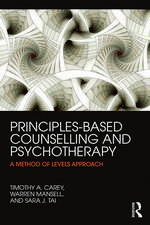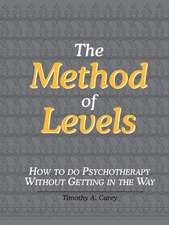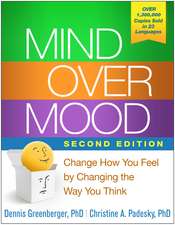A Transdiagnostic Approach to CBT using Method of Levels Therapy: Distinctive Features: CBT Distinctive Features
Autor Warren Mansell, Timothy A. Carey, Sara J. Taien Limba Engleză Paperback – 5 noi 2012
The transdiagnostic approach is supported by a wealth of evidence that processes such as worry, emotion suppression, self-criticism and avoidance maintain distress across psychological disorders. Perceptual Control Theory (PCT) explains all of these processes as forms of ‘inflexible control’, and Method of Levels Therapy (MOL) helps people to let go of these habits. The principles and techniques of MOL are clearly and practically described for clinicians to offer a transdiagnostic CBT that is tailor-made to the goals of each client.
This novel volume will be essential reading for novice and experienced CBT therapists, as well as counsellors and psychotherapists. Its accessible explanation of Perceptual Control Theory and its application to real world problems also makes a useful resource for undergraduates, graduates and researchers in psychology.
| Toate formatele și edițiile | Preț | Express |
|---|---|---|
| Paperback (1) | 146.74 lei 6-8 săpt. | |
| Taylor & Francis – 5 noi 2012 | 146.74 lei 6-8 săpt. | |
| Hardback (1) | 656.26 lei 6-8 săpt. | |
| Taylor & Francis – 12 noi 2012 | 656.26 lei 6-8 săpt. |
Din seria CBT Distinctive Features
- 5%
 Preț: 137.56 lei
Preț: 137.56 lei - 5%
 Preț: 138.47 lei
Preț: 138.47 lei - 5%
 Preț: 137.80 lei
Preț: 137.80 lei - 5%
 Preț: 152.17 lei
Preț: 152.17 lei - 5%
 Preț: 137.79 lei
Preț: 137.79 lei -
 Preț: 152.46 lei
Preț: 152.46 lei - 5%
 Preț: 159.04 lei
Preț: 159.04 lei - 5%
 Preț: 124.15 lei
Preț: 124.15 lei - 5%
 Preț: 123.42 lei
Preț: 123.42 lei - 5%
 Preț: 149.54 lei
Preț: 149.54 lei - 5%
 Preț: 123.24 lei
Preț: 123.24 lei - 5%
 Preț: 145.14 lei
Preț: 145.14 lei - 5%
 Preț: 144.72 lei
Preț: 144.72 lei - 5%
 Preț: 144.76 lei
Preț: 144.76 lei - 5%
 Preț: 159.40 lei
Preț: 159.40 lei - 5%
 Preț: 138.25 lei
Preț: 138.25 lei - 5%
 Preț: 145.22 lei
Preț: 145.22 lei - 17%
 Preț: 159.51 lei
Preț: 159.51 lei - 22%
 Preț: 118.21 lei
Preț: 118.21 lei - 5%
 Preț: 145.14 lei
Preț: 145.14 lei - 22%
 Preț: 112.80 lei
Preț: 112.80 lei - 5%
 Preț: 124.87 lei
Preț: 124.87 lei
Preț: 146.74 lei
Preț vechi: 154.47 lei
-5% Nou
Puncte Express: 220
Preț estimativ în valută:
28.08€ • 29.32$ • 23.19£
28.08€ • 29.32$ • 23.19£
Carte tipărită la comandă
Livrare economică 15-29 aprilie
Preluare comenzi: 021 569.72.76
Specificații
ISBN-13: 9780415507646
ISBN-10: 0415507642
Pagini: 192
Ilustrații: 5 black & white illustrations, 1 black & white tables, 5 black & white line drawings
Dimensiuni: 123 x 186 x 15 mm
Greutate: 0.36 kg
Ediția:1
Editura: Taylor & Francis
Colecția Routledge
Seria CBT Distinctive Features
Locul publicării:Oxford, United Kingdom
ISBN-10: 0415507642
Pagini: 192
Ilustrații: 5 black & white illustrations, 1 black & white tables, 5 black & white line drawings
Dimensiuni: 123 x 186 x 15 mm
Greutate: 0.36 kg
Ediția:1
Editura: Taylor & Francis
Colecția Routledge
Seria CBT Distinctive Features
Locul publicării:Oxford, United Kingdom
Public țintă
Postgraduate, Professional, and Professional Practice & DevelopmentCuprins
Introduction. Part I: Theory. Thinking styles and behaviours that maintain psychological distress are transdiagnostic. Transdiagnostic processes overlap to form a core process that maintains distress. The phenomenon of control - perception, comparison, and action. The control of perception - not the control of behaviour. The negative feedback loop. Basic causes of the loss of control. Hierarchies of Control – Going up and down levels. Conflict. Reorganisation – a non-linear process of change. Awareness and imagination. Arbitrary (or inflexible) control maintains distress via conflict. Directing awareness to regain flexible control - a common factor of CBT, effective therapy, and natural recovery. Interpersonal control. Circular causality and model building. It’s all perception. Part II: Practice. The setting conditions: A problem that the client is willing to talk about. The stance: To enable the client’s flexible control as efficiently as possible. Method of Levels goal one: asking about the current problem. Method of Levels goal two: asking about disruptions. Using the past, controlling the present and living for the future. "Green Apples" – Working through problems without disclosure. What to say at the first session. How much treatment and how often to provide it. A focus on distress rather than symptoms. Outcome monitoring. Evaluating your own practice. The therapeutic relationship – liberated exploration. Building MOL into other therapies and therapeutic practices. Utilising control theory in existing CBT. Interventions without talking - testing the controlled variable.
Notă biografică
Warren Mansell is a Reader in Psychology, Accredited Cognitive Behavioural Therapist, and Chartered Clinical Psychologist. He has authored over 100 publications on CBT and in 2011 received the May Davidson Award from the British Psychological Society for an outstanding contribution to the field of clinical psychology in the first ten years since qualifying.
Timothy A. Carey is the Associate Professor in Mental Health at the Centre for Remote Health in Alice Springs, Australia. He has been using the Method of Levels in a variety of settings for over ten years and has researched and published extensively on its use.
Sara J. Tai is a Senior Lecturer in Clinical Psychology at the University of Manchester, Chartered Clinical Psychologist and Accredited Cognitive Behavioural Therapist. She is an experienced researcher, practitioner, trainer and supervisor of Cognitive Behaviour Therapies, including the Method of Levels.
Timothy A. Carey is the Associate Professor in Mental Health at the Centre for Remote Health in Alice Springs, Australia. He has been using the Method of Levels in a variety of settings for over ten years and has researched and published extensively on its use.
Sara J. Tai is a Senior Lecturer in Clinical Psychology at the University of Manchester, Chartered Clinical Psychologist and Accredited Cognitive Behavioural Therapist. She is an experienced researcher, practitioner, trainer and supervisor of Cognitive Behaviour Therapies, including the Method of Levels.
Recenzii
"It is wonderful to see the clarity and orderliness of thinking in this book, and to recognize my old ideas rejuvenated, expanded, connected to what really goes on in a real psychotherapist's world, and filled with new meanings I never could have anticipated. In the hands of Mansell, Carey, and Tai, Perceptual Control Theory takes on a new life of its own, becomes more mature, better organized, more practical, more inspiring." - Bill Powers, Developer of Perceptual Control Theory, Lafayette, Colorado, USA
"This short book gives an accessible account of the theory and practice of the Method of Levels (MOL), a distinctive and pragmatic approach to psychological therapy. It is simple enough to make you wonder why you didn't think of it first, but novel and profound enough to change what you notice and what you do in therapy." - William B. Stiles, Professor Emeritus, Miami University, Oxford, Ohio, USA
"The hallmark of all living things is that they are self-organising to achieve goals – survival and reproduction in the first instance. Goals of course can also be in conflict, creating disorganisation. In this landmark book, Mansell, Carey and Tai describe Perceptual Control Theory to explore these issues and as a way of taking a transdiagnostic and goal-oriented approach to mental health problems and therapy. Highly accessible, and innovative, the book brings many fresh insights to old problems. A book of high quality, scholarship and usefulness, this volume is a delight to read and learn from." - Paul Gilbert, OBE, University of Derby, Fellow of the British Psychological Society, UK
"This book provides an innovative and effective new approach to understanding psychopathology and treatment. Based on Perceptual and Control Theory, Methods of Levels helps the clinician implement questions and interventions that allow more flexible and effective control for clients, tune in to what is going on in the present moment, relate one level of behavior to higher levels of goals, while helping clients pursue purpose beyond the current "symptom". The verbatim dialogues give the reader wonderful examples of precisely what can be done and how clients respond. Written in a clear and practical style, this book will help clinicians from all CBT models. I highly recommend this valuable book." - Robert L. Leahy, Weill-Cornell University Medical College, New York, USA
"This is a wonderful book; intelligent, accessible, innovative and useful. It should be invaluable reading for anyone who wishes to improve their understanding of the human mind or to improve their effectiveness as a therapist." - Peter Kinderman, University of Liverpool, UK
"This book describes a revolution in psychotherapy. It describes how Powers' rigorous model of mental life is applied to psychopathology through the visionary casework of Tim Carey. The Method of Levels can be used in a pure form or as a technique within CBT and other therapies when there seems little prospect of further progress. The contents are challenging and will require further empirical support but the clinical applications are compelling. My personal experience is that there is something here of great value and that this volume should be widely read and debated. Researchers and clinicians alike should buy this book." - Doug Turkington, Newcastle University, UK
"This book is a refreshing addition to the literature on psychological treatments for mental disorders, in that it goes beyond disease entities, adopting rather what is termed a ‘transdiagnostic’ approach to human maladies; and that it goes beyond the ubiquitous cognitive behaviour therapy, building on the core thereof but offering new flexibility and understandings within the Method of Levels paradigm. It covers theoretical and practical aspects of the model, making it an ideal reference source as well as a clinical guide." - David Castle, St Vincent's Hospital and The University of Melbourne, Australia
"A truly insightful, important book. A ‘must read’ for all who seek to understand themselves and other people better, particularly those whose lives have been touched by depression, anxiety and stress." - Allison Harvey, University of California, Berkeley, USA
"Perceptual control theory and the associated ‘Method of Levels’ therapy is a new form of cognitive behaviour therapy designed to help ‘people to reflect on their thinking and behaviour in a way that helps them become more flexible and adept at reducing their own distress.’ (p.2). New forms of talking therapy are much needed to help those that do not find current treatments acceptable or effective. Method of Levels treatment is designed for all forms of mental health problems, and such a ‘transdiagnostic’ approach will help to ensure that it is implemented in clinical practice. The authors are to be commended on advancing the field with such an authoritative book on both perceptual control theory and its therapeutic implications." - Roz Shafran, University of Reading, UK
"A refreshing manual that presents a thought-provoking look behind the scenes of therapeutic change. This very readable, informed text is both theoretically coherent and unashamedly practical. It dares to suggest that the truth - about the shared process of psychological change of all psychological therapies - might actually be out there!" - Terry Hanley, PhD, British Psychological Society, UK
"A great achievement! Every therapist should read this book. The Method of Levels is a very clever method to alleviate distress and offers a very interesting promise to boost the development of cognitive behavioural therapy, both in practice and in research." - Miguel M. Gonçalves, University of Minho, Portugal
"This is a an excellent book that introduces a break-through advancement of Cogntiive Behavioral Therapy (CBT), the most effective psychological treatment. Using a control theory approach to CBT, the authors clearly outline a transdiagnostic form of psychotherapy that targets the distress that arises when people cannot reach their goals in life. This is a must-read text for every practicing clinician and an important book for every therapist in training." - Stefan G. Hofmann, Ph.D, Author of An Introduction to Modern CBT (Wiley-Blackwell), Boston University, USA
"This short book gives an accessible account of the theory and practice of the Method of Levels (MOL), a distinctive and pragmatic approach to psychological therapy. It is simple enough to make you wonder why you didn't think of it first, but novel and profound enough to change what you notice and what you do in therapy." - William B. Stiles, Professor Emeritus, Miami University, Oxford, Ohio, USA
"The hallmark of all living things is that they are self-organising to achieve goals – survival and reproduction in the first instance. Goals of course can also be in conflict, creating disorganisation. In this landmark book, Mansell, Carey and Tai describe Perceptual Control Theory to explore these issues and as a way of taking a transdiagnostic and goal-oriented approach to mental health problems and therapy. Highly accessible, and innovative, the book brings many fresh insights to old problems. A book of high quality, scholarship and usefulness, this volume is a delight to read and learn from." - Paul Gilbert, OBE, University of Derby, Fellow of the British Psychological Society, UK
"This book provides an innovative and effective new approach to understanding psychopathology and treatment. Based on Perceptual and Control Theory, Methods of Levels helps the clinician implement questions and interventions that allow more flexible and effective control for clients, tune in to what is going on in the present moment, relate one level of behavior to higher levels of goals, while helping clients pursue purpose beyond the current "symptom". The verbatim dialogues give the reader wonderful examples of precisely what can be done and how clients respond. Written in a clear and practical style, this book will help clinicians from all CBT models. I highly recommend this valuable book." - Robert L. Leahy, Weill-Cornell University Medical College, New York, USA
"This is a wonderful book; intelligent, accessible, innovative and useful. It should be invaluable reading for anyone who wishes to improve their understanding of the human mind or to improve their effectiveness as a therapist." - Peter Kinderman, University of Liverpool, UK
"This book describes a revolution in psychotherapy. It describes how Powers' rigorous model of mental life is applied to psychopathology through the visionary casework of Tim Carey. The Method of Levels can be used in a pure form or as a technique within CBT and other therapies when there seems little prospect of further progress. The contents are challenging and will require further empirical support but the clinical applications are compelling. My personal experience is that there is something here of great value and that this volume should be widely read and debated. Researchers and clinicians alike should buy this book." - Doug Turkington, Newcastle University, UK
"This book is a refreshing addition to the literature on psychological treatments for mental disorders, in that it goes beyond disease entities, adopting rather what is termed a ‘transdiagnostic’ approach to human maladies; and that it goes beyond the ubiquitous cognitive behaviour therapy, building on the core thereof but offering new flexibility and understandings within the Method of Levels paradigm. It covers theoretical and practical aspects of the model, making it an ideal reference source as well as a clinical guide." - David Castle, St Vincent's Hospital and The University of Melbourne, Australia
"A truly insightful, important book. A ‘must read’ for all who seek to understand themselves and other people better, particularly those whose lives have been touched by depression, anxiety and stress." - Allison Harvey, University of California, Berkeley, USA
"Perceptual control theory and the associated ‘Method of Levels’ therapy is a new form of cognitive behaviour therapy designed to help ‘people to reflect on their thinking and behaviour in a way that helps them become more flexible and adept at reducing their own distress.’ (p.2). New forms of talking therapy are much needed to help those that do not find current treatments acceptable or effective. Method of Levels treatment is designed for all forms of mental health problems, and such a ‘transdiagnostic’ approach will help to ensure that it is implemented in clinical practice. The authors are to be commended on advancing the field with such an authoritative book on both perceptual control theory and its therapeutic implications." - Roz Shafran, University of Reading, UK
"A refreshing manual that presents a thought-provoking look behind the scenes of therapeutic change. This very readable, informed text is both theoretically coherent and unashamedly practical. It dares to suggest that the truth - about the shared process of psychological change of all psychological therapies - might actually be out there!" - Terry Hanley, PhD, British Psychological Society, UK
"A great achievement! Every therapist should read this book. The Method of Levels is a very clever method to alleviate distress and offers a very interesting promise to boost the development of cognitive behavioural therapy, both in practice and in research." - Miguel M. Gonçalves, University of Minho, Portugal
"This is a an excellent book that introduces a break-through advancement of Cogntiive Behavioral Therapy (CBT), the most effective psychological treatment. Using a control theory approach to CBT, the authors clearly outline a transdiagnostic form of psychotherapy that targets the distress that arises when people cannot reach their goals in life. This is a must-read text for every practicing clinician and an important book for every therapist in training." - Stefan G. Hofmann, Ph.D, Author of An Introduction to Modern CBT (Wiley-Blackwell), Boston University, USA
Descriere
The principles and techniques of PCT and MOL are clearly and practically described for clinicians to offer a transdiagnostic CBT that is tailor-made to the goals of each client.




















